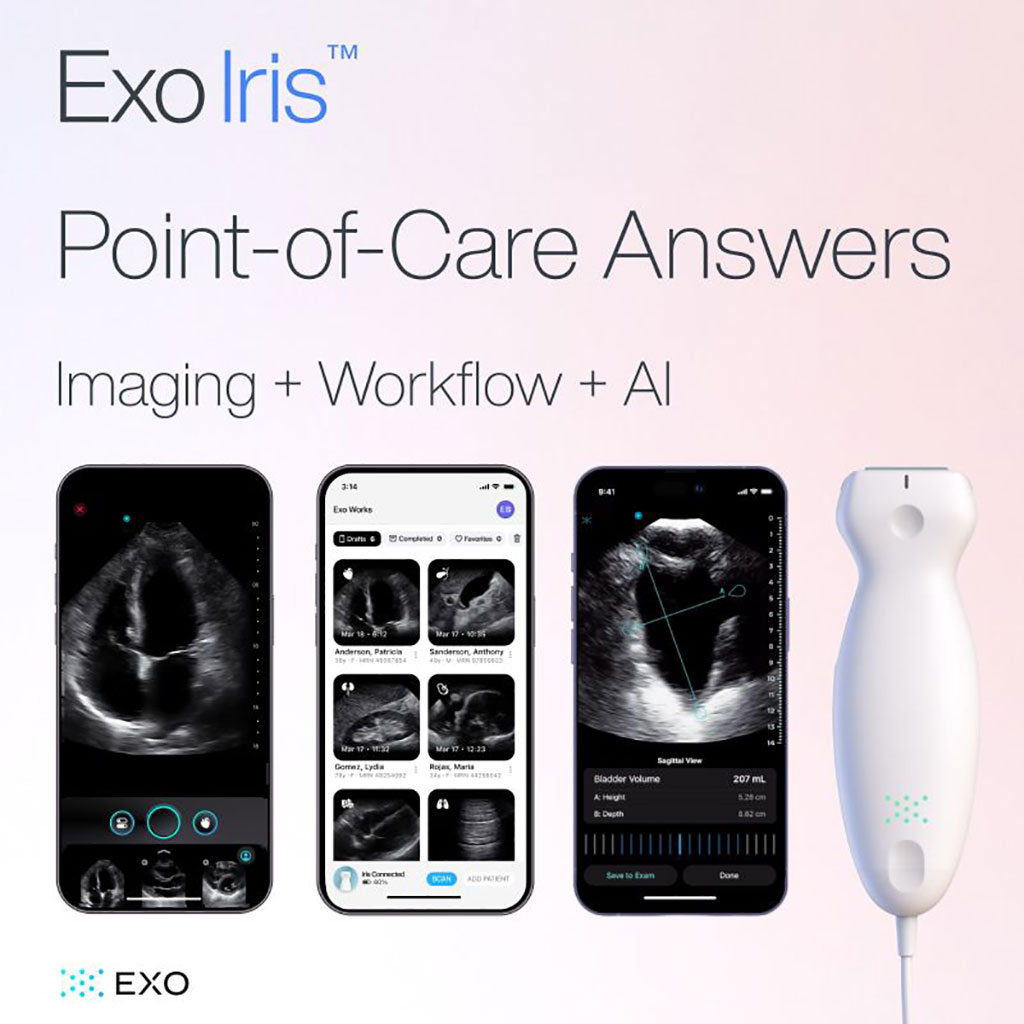Ultrasound Adoption in Primary Care to Become Widespread within Five Years, Reveals Study
|
By MedImaging International staff writers Posted on 17 Nov 2023 |

A survey involving over 150 physicians from the United States has shed light on the current trends and challenges in the adoption and use of point-of-care ultrasound (POCUS). The survey delved into issues such as the limitations of existing POCUS solutions, the potential benefits of handheld POCUS devices, and the transformative role of emerging technologies like artificial intelligence (AI) in enhancing medical imaging, particularly in the field of primary care.
One of the key findings of the 2023 Survey Report: Unlocking Point-of-Care Ultrasound by Exo Inc. (Santa Clara, CA, USA) was the slow pace of POCUS adoption across the healthcare spectrum. The report highlights the primary challenges faced by healthcare providers, including poor image quality and the difficulty of integrating POCUS devices with existing hospital IT infrastructure, like PACS and electronic health records (EHR). This complexity not only makes training on POCUS devices challenging but also leads to cumbersome processes for documenting, storing, and billing ultrasound exams. The survey revealed that a mere 68% of ultrasound exams are documented, raising concerns about compliance and legal exposure, while only half of these documented exams are actually billed, signifying a significant loss of revenue for healthcare systems.
Handheld POCUS devices, recognized for their simplicity and cost-effectiveness compared to traditional cart-based systems, are seen as a solution to the accessibility issue in medical imaging. An overwhelming 88% of survey respondents believe that the availability of handheld devices will significantly boost the adoption of POCUS. This could have far-reaching implications, especially in areas where access to essential health services, including medical imaging, is limited. The integration of AI in POCUS devices is also a significant development. AI can assist in image capture and interpretation by referencing a vast database of ultrasound images, potentially enabling a broader range of healthcare providers to use ultrasound technology. According to the survey, 79% of respondents feel that AI will positively impact POCUS, with 63% believing it will streamline image interpretation. This AI assistance is crucial in reducing operator dependency and enhancing the accuracy and consistency of imaging.
In primary care, the use of handheld POCUS devices is particularly promising. These devices offer greater accessibility and affordability, making them suitable for primary care settings that often operate with limited space and budget. The survey indicates that 61% of respondents consider it important for primary care providers to adopt handheld POCUS devices, and half believe that their use in primary care will become mainstream within five years. The advancement of AI and the development of handheld devices are expected to facilitate the wider use of ultrasound imaging across various healthcare settings.
“POCUS is critical for a more equitable and healthier world. These survey results validate just how severely caregivers are craving a new medical imaging approach. That’s why Exo has built a simple and accessible ecosystem to deliver immediate answers at the point of care," said Sandeep Akkaraju, CEO and Co-Founder of Exo. “Our ecosystem combines high-performance imaging to retrieve instant answers in any setting, workflow software to seamlessly document and bill ultrasound exams in seconds from anywhere, and AI to easily acquire consistent and accurate images in real-time. Medical imaging as we know it has entered a new age.”
Related Links:
Exo Inc.
Latest Ultrasound News
- Tiny Magnetic Robot Takes 3D Scans from Deep Within Body
- High Resolution Ultrasound Speeds Up Prostate Cancer Diagnosis
- World's First Wireless, Handheld, Whole-Body Ultrasound with Single PZT Transducer Makes Imaging More Accessible
- Artificial Intelligence Detects Undiagnosed Liver Disease from Echocardiograms
- Ultrasound Imaging Non-Invasively Tracks Tumor Response to Radiation and Immunotherapy
- AI Improves Detection of Congenital Heart Defects on Routine Prenatal Ultrasounds
- AI Diagnoses Lung Diseases from Ultrasound Videos with 96.57% Accuracy
- New Contrast Agent for Ultrasound Imaging Ensures Affordable and Safer Medical Diagnostics
- Ultrasound-Directed Microbubbles Boost Immune Response Against Tumors
- POC Ultrasound Enhances Early Pregnancy Care and Cuts Emergency Visits
- AI-Based Models Outperform Human Experts at Identifying Ovarian Cancer in Ultrasound Images
- Automated Breast Ultrasound Provides Alternative to Mammography in Low-Resource Settings
- Transparent Ultrasound Transducer for Photoacoustic and Ultrasound Endoscopy to Improve Diagnostic Accuracy
- Wearable Ultrasound Patch Enables Continuous Blood Pressure Monitoring
- AI Image-Recognition Program Reads Echocardiograms Faster, Cuts Results Wait Time
- Ultrasound Device Non-Invasively Improves Blood Circulation in Lower Limbs
Channels
Radiography
view channel
AI-Powered Imaging Technique Shows Promise in Evaluating Patients for PCI
Percutaneous coronary intervention (PCI), also known as coronary angioplasty, is a minimally invasive procedure where small metal tubes called stents are inserted into partially blocked coronary arteries... Read more
Higher Chest X-Ray Usage Catches Lung Cancer Earlier and Improves Survival
Lung cancer continues to be the leading cause of cancer-related deaths worldwide. While advanced technologies like CT scanners play a crucial role in detecting lung cancer, more accessible and affordable... Read moreMRI
view channel
Ultra-Powerful MRI Scans Enable Life-Changing Surgery in Treatment-Resistant Epileptic Patients
Approximately 360,000 individuals in the UK suffer from focal epilepsy, a condition in which seizures spread from one part of the brain. Around a third of these patients experience persistent seizures... Read more
AI-Powered MRI Technology Improves Parkinson’s Diagnoses
Current research shows that the accuracy of diagnosing Parkinson’s disease typically ranges from 55% to 78% within the first five years of assessment. This is partly due to the similarities shared by Parkinson’s... Read more
Biparametric MRI Combined with AI Enhances Detection of Clinically Significant Prostate Cancer
Artificial intelligence (AI) technologies are transforming the way medical images are analyzed, offering unprecedented capabilities in quantitatively extracting features that go beyond traditional visual... Read more
First-Of-Its-Kind AI-Driven Brain Imaging Platform to Better Guide Stroke Treatment Options
Each year, approximately 800,000 people in the U.S. experience strokes, with marginalized and minoritized groups being disproportionately affected. Strokes vary in terms of size and location within the... Read moreNuclear Medicine
view channel
Novel PET Imaging Approach Offers Never-Before-Seen View of Neuroinflammation
COX-2, an enzyme that plays a key role in brain inflammation, can be significantly upregulated by inflammatory stimuli and neuroexcitation. Researchers suggest that COX-2 density in the brain could serve... Read more
Novel Radiotracer Identifies Biomarker for Triple-Negative Breast Cancer
Triple-negative breast cancer (TNBC), which represents 15-20% of all breast cancer cases, is one of the most aggressive subtypes, with a five-year survival rate of about 40%. Due to its significant heterogeneity... Read moreGeneral/Advanced Imaging
view channel
AI Model Significantly Enhances Low-Dose CT Capabilities
Lung cancer remains one of the most challenging diseases, making early diagnosis vital for effective treatment. Fortunately, advancements in artificial intelligence (AI) are revolutionizing lung cancer... Read more
Ultra-Low Dose CT Aids Pneumonia Diagnosis in Immunocompromised Patients
Lung infections can be life-threatening for patients with weakened immune systems, making timely diagnosis crucial. While CT scans are considered the gold standard for detecting pneumonia, repeated scans... Read moreImaging IT
view channel
New Google Cloud Medical Imaging Suite Makes Imaging Healthcare Data More Accessible
Medical imaging is a critical tool used to diagnose patients, and there are billions of medical images scanned globally each year. Imaging data accounts for about 90% of all healthcare data1 and, until... Read more
Global AI in Medical Diagnostics Market to Be Driven by Demand for Image Recognition in Radiology
The global artificial intelligence (AI) in medical diagnostics market is expanding with early disease detection being one of its key applications and image recognition becoming a compelling consumer proposition... Read moreIndustry News
view channel
GE HealthCare and NVIDIA Collaboration to Reimagine Diagnostic Imaging
GE HealthCare (Chicago, IL, USA) has entered into a collaboration with NVIDIA (Santa Clara, CA, USA), expanding the existing relationship between the two companies to focus on pioneering innovation in... Read more
Patient-Specific 3D-Printed Phantoms Transform CT Imaging
New research has highlighted how anatomically precise, patient-specific 3D-printed phantoms are proving to be scalable, cost-effective, and efficient tools in the development of new CT scan algorithms... Read more
Siemens and Sectra Collaborate on Enhancing Radiology Workflows
Siemens Healthineers (Forchheim, Germany) and Sectra (Linköping, Sweden) have entered into a collaboration aimed at enhancing radiologists' diagnostic capabilities and, in turn, improving patient care... Read more


















